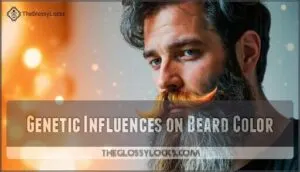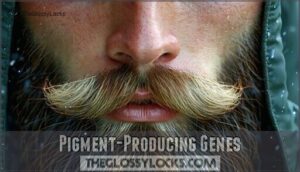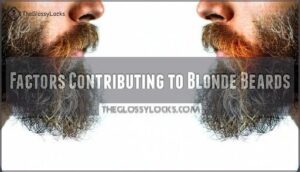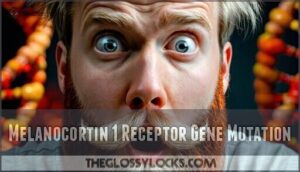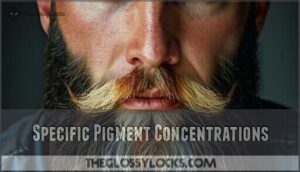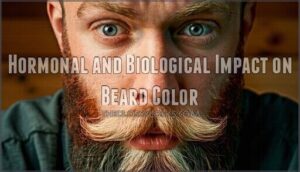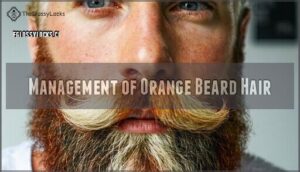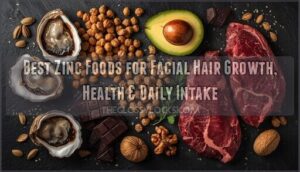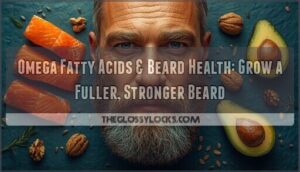This site is supported by our readers. We may earn a commission, at no cost to you, if you purchase through links.
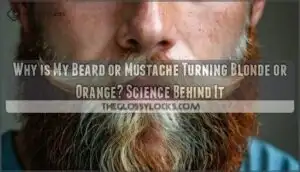
Genetics play the biggest role – if you carry certain variants of the melanocortin 1 receptor gene, you’ll produce more pheomelanin, which creates red and orange tones.
Sun exposure can also bleach darker pigments, leaving behind these warmer hues.
Age, stress, and nutritional factors affect pigment production too.
It’s completely normal and happens to many men, even if their head hair is a different color.
The same genetic lottery that determines your eye color is working behind the scenes in your facial hair, and it’s influenced by the production of pheomelanin.
Table Of Contents
- Key Takeaways
- Why is My Beard or Mustache Turning Blonde or Orange?
- Genetic Influences on Beard Color
- Pigment-Producing Genes
- Factors Contributing to Blonde Beards
- Understanding Red and Orange Beard Hues
- Effects of Sunlight on Beard Color
- Hormonal and Biological Impact on Beard Color
- Management of Orange Beard Hair
- Frequently Asked Questions (FAQs)
- Why does my beard turn orange?
- Why does my beard turn blonde?
- Why does my beard look different?
- Why does my beard change color?
- Why does my beard turn red?
- Why is my mustache turning blonde?
- Why is my beard turning blonde?
- Why is my beard a different color than my head?
- What causes red & orange beard hair?
- Why does my beard look Orange?
- Conclusion
Key Takeaways
- Your beard or mustache turns blonde or orange mostly because of genetics, especially if you carry certain MC1R gene variants that boost red and yellow pigments.
- Sun exposure breaks down darker melanin in your facial hair, making lighter, warmer tones like blonde or orange more visible.
- Age, stress, and nutritional deficiencies can shift pigment production, causing unexpected color changes in your beard or mustache.
- It’s normal for your facial hair to be a different color than your head hair due to the unique mix of pigment-producing genes in each area, and this is often influenced by certain MC1R gene variants.
Why is My Beard or Mustache Turning Blonde or Orange?
Your beard turning blonde or orange happens through several Color Change Causes.
Genetic Predisposition determines melanin production, while sun exposure creates Pigment Degradation through UV damage.
Environmental Factors like chemical exposure and Health Conditions including nutritional deficiencies also trigger beard color shifts.
Sun bleaching beard hair occurs when UV rays break down darker pigments, leaving lighter tones behind.
Deficiencies in key nutrients like vitamin B12 deficiency can also impact beard color.
Genetic Influences on Beard Color
When your beard starts sporting unexpected hues, you’re witnessing genetic factors at work. Your ancestry influence determines which pigment-producing genes get activated, creating a unique color blueprint that often differs from your scalp hair.
Your genetic blueprint creates a unique beard color that often surprises with its fiery transformations.
The MC1R gene acts as your follicle’s master switch, controlling melanin production. Genetic mosaicism means different hair follicles can have varying genetic makeups, explaining why some hairs turn blonde or orange while others stay dark.
This creates a natural patchwork of colors across your beard. Eumelanin levels determine brown and black tones, while pheomelanin dominance produces red, yellow, and orange hues. When pheomelanin takes charge in certain follicles, you’ll see those warmer tones emerge.
Your genetic inheritance from both parents creates this complex melanin cocktail. Multiple genes work together—there’s no single "beard color gene." Even siblings can have completely different facial hair colors due to unique gene combinations inherited from maternal and paternal lines, making your beard’s transformation a fascinating display of your genetic heritage.
Family history reveals the influence of IRF4 gene variants on beard pigmentation.
Pigment-Producing Genes
How do pigment-producing genes determine whether your beard turning blonde happens naturally?
Your hair follicles contain specialized cells that manufacture two key pigments: eumelanin control creates brown and black shades, while pheomelanin dominance produces red and yellow tones.
The MC1R gene acts as the master controller, with MC1R variations creating dramatically different color outcomes in your facial hair.
Genetic mosaicism explains why your beard might display multiple colors simultaneously.
Each follicle can have slightly different genetic instructions, leading to follicle differences in pigment production.
This means some areas produce more eumelanin while others favor pheomelanin, creating that distinctive multicolored effect you’re seeing.
Pigment-producing genes don’t work alone—they’re part of a complex network inherited from both parents.
Your mustache turning blonde might reflect different genetic expressions than your cheek hair.
These blonde beard causes stem from your unique genetic combination, explaining why siblings often have completely different facial hair colors despite sharing parents.
Factors Contributing to Blonde Beards
Your beard’s changing color isn’t random – it’s driven by specific biological factors that affect pigment production in your facial hair follicles.
Two main contributors explain why you’re seeing blonde hues: high concentrations of pheomelanin (the pigment responsible for red and yellow tones) and various age-related or lifestyle influences that alter your hair’s natural color balance.
High Pheomelanin Concentration
When pheomelanin production ramps up in your follicles, you’re looking at the main culprit behind your blonde beard.
This yellow-red pigment takes center stage when eumelanin (the dark stuff) gets sidelined. Pigment dominance varies between follicles, explaining why some hairs shine golden while others stay brunette.
Your Red Beard Genetics and MC1R Influence determine this pheomelanin concentration, creating those striking blonde beard and orange beard combinations that make your facial hair uniquely yours.
Age and Lifestyle Influences
Time’s unforgiving march affects your facial hair in surprising ways.
Age naturally reduces melanin production, causing Beard Graying before you hit forty.
Lifestyle choices compound these changes – sun exposure creates UV damage that bleaches pigments, while Smoking Link accelerates premature graying by 2.5 times.
Nutritional deficiencies starve follicles of essential vitamins, and Stress Impact triggers Hormonal Shifts that disrupt normal pigmentation patterns, leaving you with unexpected blonde patches.
Genetics also play a role, influencing melanin production levels responsible for hair color.
Understanding Red and Orange Beard Hues
Your beard’s shift to red or orange tones isn’t a mystery—it’s genetics at work.
Your genetic lottery ticket determines whether your beard goes blonde, orange, or stays dark—no mystery, just science.
When you carry specific mutations in the MC1R gene, your hair follicles produce higher concentrations of pheomelanin, the pigment responsible for creating those fiery hues that affect only 1-2% of the population.
Melanocortin 1 Receptor Gene Mutation
Your MC1R gene holds the key to red and orange facial hair surprises.
When this red hair gene mutates, it disrupts normal pigmentation pathways, allowing pheomelanin to dominate over eumelanin.
Here’s how MC1R variants create those fiery hues:
- Genetic factors block pigment conversion from red to brown
- Ancestry impact determines your likelihood of carrying mutations
- Pheomelanin accumulates without proper regulation
- Genetic testing can reveal your MC1R status
Only 1-2% experience this fascinating genetic quirk.
Lifestyle factors, such as stress, can also affect melanin production timelines.
Specific Pigment Concentrations
Your unique beard color change stems from how your follicles mix melanin.
When specific pigment concentrations vary between follicles, you get hue variations that create mustache turning orange or blonde patches.
Variations in melanin distribution can also affect hair color.
| Pigment Type | Color Result |
|---|---|
| High Pheomelanin | Orange/Red tones |
| Low Eumelanin | Blonde appearance |
| Mixed Ratios | Multicolored beard |
| Uneven Distribution | Patchy coloring |
Follicle differences in color expression explain why your beard turning orange happens in specific spots while other areas stay dark.
Effects of Sunlight on Beard Color
You’ve probably noticed your beard catching some sun and wondered why it’s starting to look lighter or taking on orange tones.
Sunlight contains UV rays that act like a natural bleaching agent, breaking down the melanin pigments in your facial hair and gradually changing its color over time.
UV Damage and Bleaching
Ever wonder why your beard looks lighter after spending time outdoors?
UV radiation breaks down melanin molecules, causing pigment degradation and sun bleaching. Harmful UV rays penetrate hair cuticles, triggering melanin breakdown that permanently alters color.
UV light effects accumulate with repeated sun exposure, making fine hair particularly vulnerable to UV damage.
Your beard needs beard protection just like your skin does. Consider using specialized beard products for added defense.
Protection Against Sun Discoloration
Your beard’s color can fade from sun bleaching, but SPF conditioners offer targeted UV protection to prevent color fading.
These specialized products create a barrier against harmful UV rays that break down melanin molecules in your facial hair.
Essential protection strategies include:
- Daily SPF application – Use beard conditioners with UV filters before sun exposure
- Melanin preservation – Choose products specifically designed for sun damage repair
- Consistent coverage – Apply evenly throughout your mustache and beard for complete protection
Regular use helps maintain your natural color while preventing the gradual lightening that occurs from UV damage.
Consistent use of wide brimmed hats can also provide a physical barrier.
Hormonal and Biological Impact on Beard Color
Your hormones and overall health can change the color of your beard, sometimes making it turn blonde or orange.
Even a stressful week or missing key nutrients can shift your facial hair’s natural shade in surprising ways.
Stress and Greying
When psychological stress hits, it doesn’t just mess with your mind—it triggers stress hormones that accelerate premature greying.
Your genetic predisposition determines how quickly this happens, but chronic stress creates oxidative stress that damages pigment-producing cells.
Lifestyle factors like poor sleep and anxiety compound the problem, making your beard go grey faster than nature intended.
Nutritional Deficiencies
Poor nutrition hits your beard where it counts.
Vitamin deficiencies, especially vitamin B12 and biotin deficiency, directly mess with melanin production in your follicles.
When you’re low on vitamin A, vitamin B, zinc, or iron, your beard can shift from dark to orange or blonde.
These mineral imbalances aren’t just cosmetic issues—they’re your body waving a red flag.
A balanced diet with proper protein intake and antioxidant needs keeps your facial hair looking its natural best.
Management of Orange Beard Hair
If you’ve noticed your beard or mustache taking on unexpected blonde or orange tones, you’re not alone in this common concern.
Understanding the underlying causes can help you take targeted steps to manage and prevent further color changes, which is crucial for maintaining your desired appearance and preventing unwanted color shifts.
Sun Damage and Prevention
Your beard’s sun exposure creates unwanted color changes through UV damage and melanin breakdown.
Think of it like a natural bleaching process – those harsh rays gradually strip away your beard’s pigments, leaving behind lighter, orange-tinted hairs.
Beard bleaching happens faster during summer care routines when you’re outdoors more.
Combat sun bleaching mustache effects with dedicated SPF protection products designed for facial hair.
To address this, consider specialized beard products for maximum protection.
These specialized conditioners create a protective barrier against harmful radiation while maintaining your beard’s natural color and health.
Lifestyle Factors and Beard Health
Your lifestyle choices directly affect beard health and color stability.
Dietary impact from poor nutrition creates vitamin deficiencies that weaken follicles. Smoking effects accelerate graying by reducing oxygen delivery.
Stress influence disrupts hormone balance, while low hydration levels make hair brittle.
Combined with sun exposure and UV damage, these nutritional deficiencies compound color changes in your beard health.
Consider using beard sunscreens for protection.
Frequently Asked Questions (FAQs)
Why does my beard turn orange?
Your beard turns orange when genetics and environment team up. Pheomelanin pigment creates reddish-yellow tones, while sun exposure breaks down darker melanin. Gene variations affect pigment production differently across follicles.
Why does my beard turn blonde?
Unlike your head hair’s predictable hue, your beard’s follicles dance to their own genetic rhythm.
Your beard turns blonde when eumelanin production drops in specific follicles, leaving behind pheomelanin’s lighter pigments, creating natural color variations.
Why does my beard look different?
Your beard’s appearance changes due to genetics, sun exposure, and aging.
Different follicles produce varying melanin levels, creating natural color variations.
UV rays bleach pigments, while hormonal shifts affect growth patterns and texture over time.
Why does my beard change color?
Your beard changes color due to genetics controlling melanin production in each follicle. Sun exposure, aging, stress, and nutritional deficiencies also affect pigmentation, causing natural variations over time.
Why does my beard turn red?
You might think only redheads get red beards, but that’s not true.
A gene called MC1R can sneak in from either parent, mixing pigments.
So, even if your hair’s brown, your beard can surprise you with fiery streaks.
Why is my mustache turning blonde?
Your mustache is turning blonde thanks to a mix of genetics, sunlight, and maybe a touch of age.
Melanin levels drop or shift, letting lighter pigments show through.
Think of it as nature’s own highlights.
Why is my beard turning blonde?
Think of your beard as a mood ring—sunlight, genes, and even stress can shift its shade.
Lower eumelanin or more pheomelanin in certain follicles causes blonde patches, especially if you’re outdoors often or have European ancestry.
Why is my beard a different color than my head?
Genetics play tricks—your facial hair gets its color from a different mix of genes than your scalp.
It’s like your face and head are distant cousins at a family reunion, sporting their own unique shades.
What causes red & orange beard hair?
Red and orange beard hairs pop up when your follicles produce more pheomelanin, thanks to variations in the MC1R gene.
Sun exposure, stress, or age can boost these fiery shades, even if your head hair stays different.
Why does my beard look Orange?
You might notice your beard looking orange because certain genes, like MC1R, boost red-yellow pigments.
Sun exposure, stress, or even diet can lighten hair, making orange tones pop.
It’s your DNA and lifestyle teaming up!
Conclusion
Funny how your beard or mustache turning blonde or orange isn’t a sign of wild adventures, but just your genes and sunlight at work.
You can thank the melanocortin 1 receptor gene, sun exposure, and a little bit of life’s stress for those warm hues.
It’s normal, even if your head hair stays dark, so unless you want to dye it, embrace the color shift—it’s just science and a bit of genetic luck showing through.

